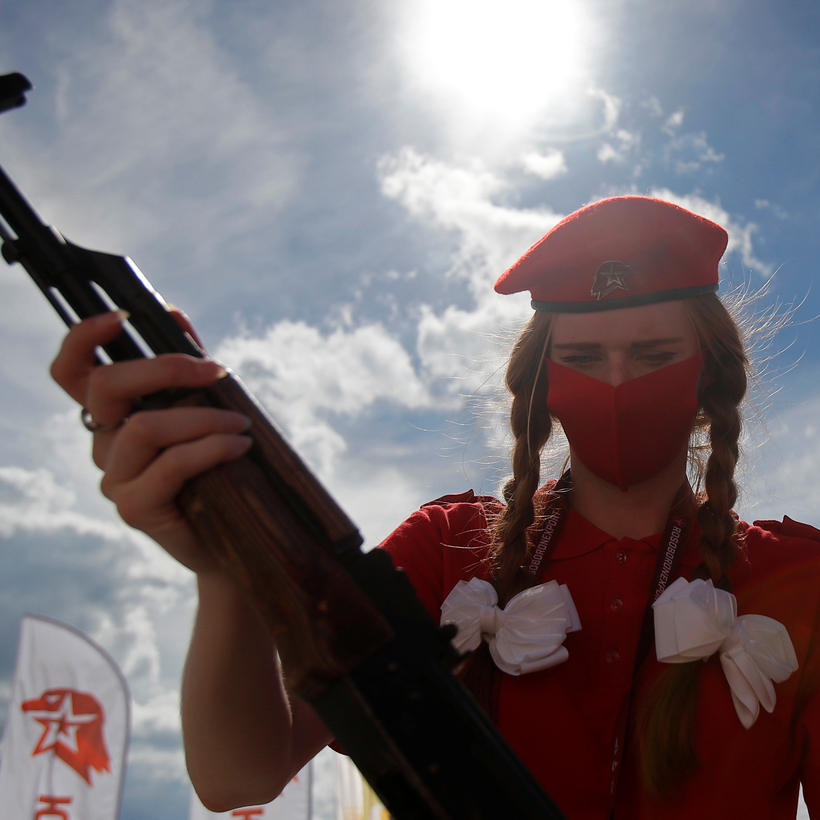With war raging in Ukraine, a strange and pernicious kind of love is being foisted on today’s Russian youth. In a country where nearly 20 percent of the population is under the age of 14, Russia has been promoting membership in its Youth Army as a way of “liberating children from the burdensome search for the self.” It’s working, too, with hundreds of thousands of young Russians, aged between 7 and 18, rushing to sign up since the Youth Army was first established, in 2016.
According to Ian Garner’s chilling exposé, Z Generation: Into the Heart of Russia’s Fascist Youth, many of these youngsters hail from the poorer southern and western regions of Russia that border Ukraine and Belarus. “Worse,” Garner writes, “the Youth Army has sought out recruits in orphanages. It claims that joining up is a solution to the alcoholism and criminality that sucks orphans in.”
Children are taught to take apart and re-assemble grenades and AK-74 rifles at summer camps and after-school events. Dressed in sandy-colored uniforms and red berets, they pose on social-media platforms such as TikTok flaunting their newly acquired skills to a captive audience of keyboard warriors.

Garner, a British historian of Russian culture and war propaganda, has interviewed dozens of young Russians for whom the digital sphere is fast becoming a proving ground for their xenophobic brand of patriotism. “It’s a nonsensical ideology,” Garner writes, “that combines contradictory elements of the Soviet past, apocalyptical spirituality, material spread by propagandists, and a fast-paced postmodern culture.”
Take 19-year-old Alina, who is addicted to her smartphone and covets the latest designer clothes, but who has also “learned to speak a language of violence—a language of Russian fascism.”
Then there is Ivan, whom Garner describes as “a very ordinary kind of fascist: [He] is still young, he’s a digital native, and he borrows liberally from the state’s language of conspiracy, hate, religion, and war to expound his theories of the world to a willing audience.”
Garner is interested in how the war in Ukraine is being used to construct identity in Russia and how the myths of the past and the glorification of death are being instrumentalized by Vladimir Putin’s minions to indoctrinate the country’s youth. Central to that is the cult of processions and parades which Putin has built up to celebrate the sacrifices of the World War II generation in the fight against Nazism.
Garner’s previous book (also his first), 2022’s Stalingrad Lives: Stories of Combat and Survival, can be read as a sort of companion piece to this latest one. Over a million Russian lives were lost defeating the Nazis during the siege of Stalingrad, and hardly a day goes by without the war in Ukraine being framed as a similarly necessary act of self-abnegation. “The state is telling its people, and above all its young, that Russia’s mission in Ukraine is messianic,” Garner writes. “Only through a supreme act of destruction can the world be saved, no matter how much sacrifice it entails.”
While Garner deftly communicates the absurdities inherent in such ways of thinking, the focus of his latest book can sometimes appear repetitive and constrained. He freely admits that many of his contacts in Russia—no doubt fearful for their lives—refused to speak to him about acts of resistance carried out by themselves or members of their families. This engenders a slightly stilted portrait of a country that appears to be almost entirely in Putin’s thrall. Perhaps that is really the case, but one can’t help thinking that a little more digging would have revealed the existence of a fledgling underground resistance.

Part of the problem, as Garner rightly points out, is that Russia is becoming increasingly opaque and isolated from the rest of the world. We are told that some young protesters are being hidden away in psychological hospitals and that others are being imprisoned on trumped-up charges. But without offering any specific examples it is hard to gauge the level of repression that is currently taking place.
In 1939, Winston Churchill famously described Russia as “a riddle wrapped in a mystery inside an enigma.” This has never seemed more apropos than it does now. How can a country that fought against Nazi fascism with such extraordinary courage now be in the process of adopting so many of its ancient foe’s worst vices? “Just as Hitler dreamed of Lebensraum for Teutonic Germans,” Garner writes, “so Putin and his propagandists speak of recreating the lost empires of the past.”
By attempting to erase Ukrainian culture, language, and tradition, Putin’s Russia is in many ways aping what the Nazis did to Europe’s Jews. It is also very hard not to see echoes of the swastika in the Z symbol being employed by the Russian government as a pro-war propaganda motif.
What’s so disappointing and made amply clear in Garner’s book is that all of this plays so well with Russia’s younger demographic. “The many voices, identities, and outcomes that might emerge from a country as vast and diverse as Russia,” Garner writes, “are being, to use George Orwell’s term from 1984, ‘vaporized.’”

Tobias Grey is a Gloucestershire, U.K.–based writer and critic, focused on art, film, and books


